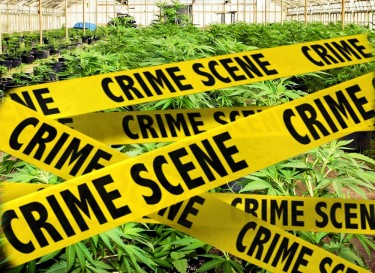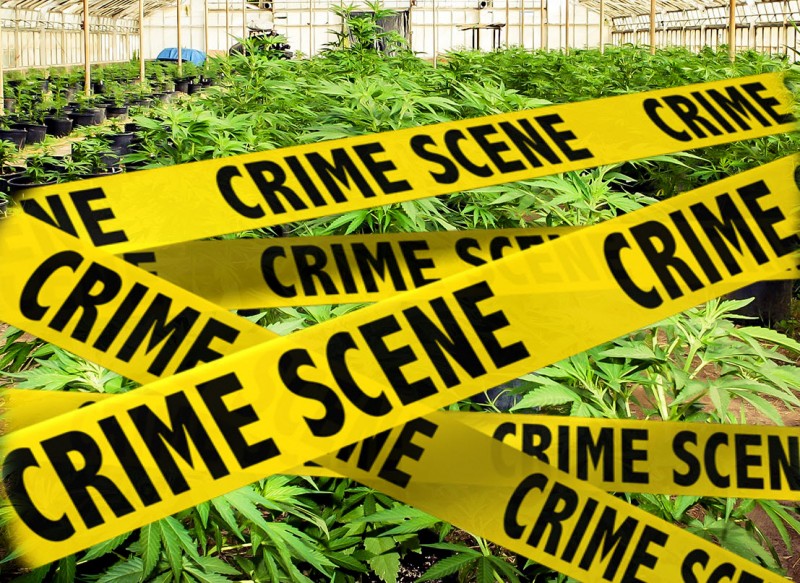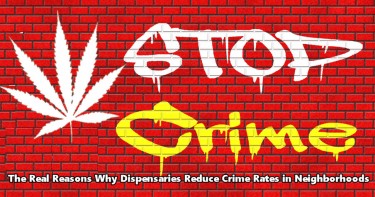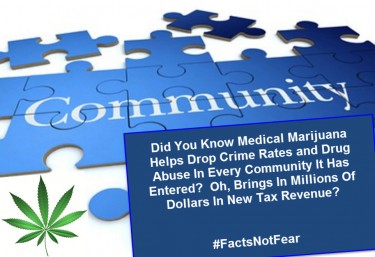Does Legal Marijuana Mean Less Crime?

The relationship between crime and marijuana has been debated for years. Some claim that marijuana causes people to turn to a life of crime and even though there's no proof to back this up, it's gospel to some. The criminalization of marijuana on a federal level already renders a large number of activities involving marijuana illegal, so marijuana-related arrests are always a thing. And critics look at the numbers (spiked up by marijuana arrests) and think the claims are true.
Contrary to what these critics believe, extensive studies conducted on the relationship between marijuana and crime show the opposite. It's been shown that in some regions where marijuana is legal the rate of crime has gone down considerably. This begs the question, what if marijuana is federally legal? Will this mean less crime?
In this article, I'll be drilling down on the relationship between marijuana and crime rate, the relevant studies that have been conducted on the subject, and lots more!
A closer look at the relationship between Marijuana and Crime
The legalization of marijuana has taken giant strides in the past couple of years. More states are becoming open to the legalization of marijuana both for medical and recreational use, and this has been great not just for the consumers but also for the state as the cannabis industry rakes in billions in revenue.
Due to the psychoactive effect of THC, the majority of people against the legalization of marijuana have sought to link marijuana use with different classes of local crime incidents. This is not to say that there are no crimes carried out with marijuana being implicated, however, to have a full picture of the situation it is important to rely on the statistics and studies conducted.
The belief that marijuana legalization increases the rate of crime was spurred on by the 2014 incident in Colorado. A year into the legalization of marijuana use, Gov. Hickenlooper raised concerns regarding the increasing crime rate in the state. However, on closer look, this cannot be completely placed at the feet of cannabis legalization because the same spikes were experienced in states where cannabis is illegal. Some states with recreational legalization experienced an increase in crime rates and homicides such as Seattle, Denver, and DC, however, so did states without recreational marijuana legalization. Cities like Baltimore, New Orleans, Chicago, and St. Louis all recorded an increase in homicide cases despite the lack of recreational marijuana legalization. Also, while this is happening in some areas there are other regions where the crime rate has gone down even though marijuana is legalized, further proving that marijuana isn't responsible for the choices some people make to turn to crime. A lot of factors play a role in why someone commits a crime and I can guarantee you marijuana isn't one of them.
The Impact of Marijuana Legalization in different classes of crime so far
To fully understand the role that marijuana legalization can play in reducing crime rate, let's take a look at the different classes of crime commonly associated with marijuana. They include crimes related to the production and distribution of marijuana, property crimes, violent crimes, traffic crimes, the use of other drugs, etc.
Crimes related to production and distribution
The first class of crimes that will be directly affected by marijuana legalization are crimes that have to do with the production and distribution of marijuana. It should be noted that this will also affect several other drug-related crimes. Washington State after recreational legalization in 2013, experienced a 98% decrease in low-level court filings for marijuana from the previous year. Statistics within the same period also showed that adults convicted for misdemeanor possession fell drastically while possession for those under 21 fell by 50%.
Legalization allows the channels of cultivation, distribution, and possession to be well mediated reducing the spread of illicit marijuana. Uruguay after legalization in 2017 experienced a 20% decrease in drug-related crimes as availability through proper channels increased. This allows more focus to be placed on other areas of crime thereby improving the effectiveness of the law-enforcement process.
Property crime
Many opponents of marijuana legalization have raised concerns about the possibility of an increase in property crimes. However, results from states that have legalized marijuana do not indicate any increase in property crimes. As a matter of fact, a study conducted in 2017 showed that the rate of property crimes in Denver and Colorado fell considerably. Another study in 2017 found that the legalization of medical marijuana in California correlated with a 20% reduction in property crimes. This goes to show that marijuana legalization has the potential of reducing the rate of property crimes especially in areas around cannabis dispensaries as there's an increased level of policing and security in such areas.
Violent crimes
Marijuana has been implicated with violent behavior in some studies. This is why the majority of people against marijuana legalization believe that it has a huge potential of increasing the rate of violent crimes. Violent crimes include homicide, assault, rape, robbery, burglary, larceny, etc. However, contrary to popular belief, recent studies conducted have shown that marijuana use does not increase the rate of violent crimes. In fact, it was shown that it has the potential to do the opposite, reduce violent crimes!
A study conducted in 2014 showed that there was a reduction of violent crimes such as homicide and assault in states where medical marijuana was legalized. This is basically because the decriminalization of marijuana increased demand through the right channels which was easily met with by supply at a reasonable market price. This is quite different from the situation of illegal production and distribution which causes illicit sale at exorbitant prices. These prices then set off a cascade of activities that lead to several violent crimes in such areas. This is not to say that legalization of marijuana is a shoo-in to reduce the rate of violent crimes, however, it removes the trafficking activities of many drug cartels and reduces the demand for illicit marijuana.
Traffic crimes
The legalization of marijuana has resulted in an increase in drivers that test positive for THC. This is beneficial when you consider that this does not necessarily translate to a higher rate of traffic crimes. A study conducted in 2013 showed that there was a decline in traffic fatalities in states that just legalized medicinal marijuana. Marijuana use is less correlated with traffic fatalities when compared to alcohol. This shows that less traffic crime occurs when drivers substitute alcohol for marijuana which doesn’t cause impairment at reasonable levels.
Bottom Line
Despite the series of studies that show the influence that marijuana legalization can have in terms of crime, it is important to stress that more studies are still needed. The early indicators already point to the fact that decriminalization of marijuana has played a pivotal role in reducing crime in some states, now imagine what can be accomplished if it's legal federally.
LESS CRIME, MORE LEGAL CANNABIS, READ MORE...
WANT TO SEE LOWER CRIME RATES, OPEN MORE DISPENSARIES, READ THIS!








